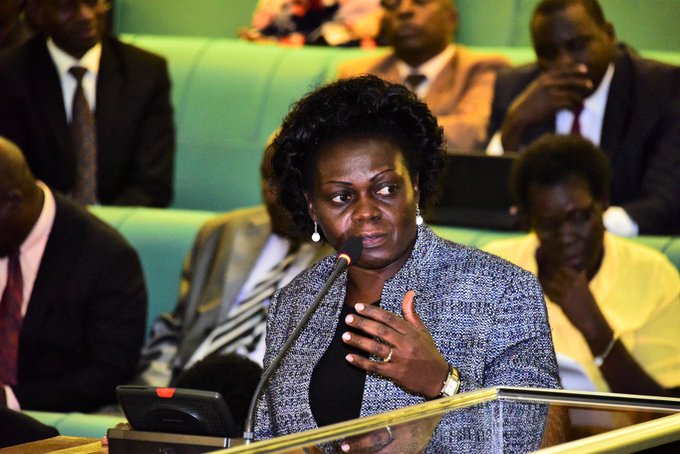Tororo District Woman Member of Parliament Sarah Opendi has suggested a 10-year jail term or a UGX20m fine or both for anyone that could be found selling alcohol after 10 pm on weekdays if her private member’s Bill titled the Alcoholic Drinks Control Bill 2023 is enacted into law.
Opendi, in the Bill she recently tabled before Parliament, wants a regulation framework for the manufacturing, importation, sale, consumption and advertisement of alcoholic drinks, as well as prohibiting the sale of alcoholic drinks to persons below 18 years.
In clause 14 of the Bill, Opendi proposes to regulate the time within which alcoholic drinks are sold in Uganda by limiting it to only 5 hours during weekdays and 12 hours during weekends.

“A licensee shall not sell an alcoholic drink or native liquor before- (a) 17:00 hours (5 pm) and after 22:00 hours (10 pm) on working days; (b) 12:00 hours (midday) and after 00:00 hours (midnight) on public holidays and weekends,” reads part of the Clause.
Opendi, while clarifying this particular clause, stated that the proposed penalty will not be applicable to a license holder operating a supermarket or depot, and such a business may sell alcoholic drinks between l0:00am and 10 pm.

According to the legislator, the time cap suggested in this clause would not apply to a person selling an alcoholic drink in a licensed tourist camp, nightclub, theatre, fetes, bazaar or trade show.
Opendi’s interpretation of a working day is that, it is any day other than a public holiday or weekend, while weekend means Saturday and Sunday, while “public holiday” means a day declared a public holiday under the Public Holidays Act.
What is in the bill?
In an attempt to curb underage drinking, Opendi, in clause 25, wants a fine not exceeding two thousand currency points (UGX40M) or imprisonment for a period not exceeding three years, or both to be imposed on any person found guilty of selling or supplying an alcoholic drink to anyone below 18years.
Where the seller doubts the age of the supposed buyer of an alcoholic drink, Opendi proposes that the person selling may demand proof of adulthood by furnishing him or her with the National Identity Card, Passport or any other document as may be prescribed by the Minister through regulations.
If passed into law, it is going to be an offence for a person who, without a license, manufactures an alcoholic drink; erects, establishes or operates a factory for the manufacture of alcoholic drink; imports an alcoholic drink; manufactures native liquor for sale; and, sells an alcoholic drink. The proposed penalty on conviction is UGX20M or imprisonment not exceeding 10 years, or both.
Also proposed to be banned is the sale and consumption of alcoholic drinks in public service vehicles, and a fine not exceeding UGX4M or imprisonment for a period not exceeding six months, or both are in the offing.
With some incidences where law enforcement officers have been accused of executing their duties while drunk, the new legislation proposes a fine not exceeding UGX4m or a jail term not exceeding 6 months or both to whoever would be found guilty of selling alcoholic drinks to officers while they are in uniform.
In clause 26, Opendi is seeking a ban on packing, importing or selling of an alcoholic drink in a sachet, plastic bottle or such other materials as may be prescribed by the Minister. Anyone found doing the contrary would, on conviction, be fined up to UGX20M or imprisonment for a period not exceeding 5 years, or both.
Clause 27 provides for proposed regulation of the quantities of alcohol packed in Uganda, and the Bill provides for a ban on the packaging of alcoholic drinks in volumes less than five hundred millilitres. To the contrary, the proposed penalty is a fine not exceeding UGX10M or a jail term not exceeding 5 years or both.
With Uganda having experienced its share of people dying after consumption of adulterated alcoholic drinks, Opendi is trying to ensure such catastrophes are avoided in future by proposing in clause 28 the prohibition of such drinks on the Ugandan market. A fine not exceeding UGX4M or imprisonment not exceeding 5 years or both is the proposed punishment.
It would also be an offence that attracts a fine of UGX4M or imprisonment for 4 years or both for a person found guilty of selling alcoholic drinks through an online platform since it may be difficult to verify the age of the buyer.
Other penalties are a fine of UGX20M or imprisonment for 2 years or both for anyone who employs a child in a bar, factor or store for alcoholic drinks; a fine of UGX8M or imprisonment for 8 years or both for anyone who does not display health warning messages in his or her premises; while the guilty party for advertising alcoholic drinking using misleading or deceptive information risks a fine of UGX20m or a jail sentence of 10 years or both.
Regulating alcoholism
Opendi defended the need to enact the Alcoholic Drinks Control law, arguing that Uganda’s statistics on alcohol consumption are worrying because its harmful use causes a high burden on the country through diseases and significant social and economic consequences.
Alcohol consumption has been found to be associated with decreased risk of overall mortality and a number of chronic non-communicable diseases, including coronary artery disease, diabetes, congestive heart failure, and stroke. High consumption of alcoholic drinks affects productivity in the communities thus there is a need to regulate manufacture, sale, protect children from easy accessibility and time for the sale of alcoholic drinks, said Opendi
A report released in 2023 by the World Health Organisation, Uganda, as the first African country in alcohol consumption, revealed that, on average, a Ugandan consumes 12.21 litres of pure alcohol annually.
The report further highlighted that men consume more than women, with an average of 19.93 litres of pure alcohol annually compared to 4.88 litres for women.
While appearing before the Committee on Health in August 2023, Juliet Nakku, Executive Director of Butabika National Referral Mental Hospital, revealed that among the patients being rehabilitated at the facility, cannabis use ranks second to alcohol abuse. She noted that out of the 7,035 patients admitted in 2022, at least 25 per cent were suffering the effects of alcohol and cannabis abuse.
Opendi is not the first MP to propose a law to regulate alcohol consumption in Uganda. In the 10th Parliament, Mukono Municipality MP Betty Nambooze unsuccessfully moved the bill, which faced fierce protest from fellow lawmakers at the time.
The current private member’s Bill is to be jointly processed by the Committee on Health and the Committee on Trade, with a report expected on the floor of Parliament at the second reading after the Christmas recess.








